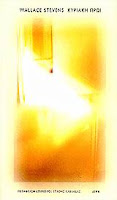One must have a mind of winter
To regard the frost and the boughs
Of the pine-trees crusted with snow;
And have been cold a long time
To behold the junipers shagged with ice,
The spruces rough in the distant glitter
Of the January sun; and not to think
Of any misery in the sound of the wind,
In the sound of a few leaves,
Which is the sound of the land
Full of the same wind
That is blowing in the same bare place
For the listener, who listens in the snow,
And, nothing himself, beholds
I
Among twenty snowy mountains,
The only moving thing
Was the eye of the blackbird.
II
I was of three minds,
Like a tree
In which there are three blackbirds.
III
The blackbird whirled in the autumn winds.
It was a small part of the pantomime.
IV
A man and a woman
Are one.
A man and a woman and a blackbird
Are one.
V
I do not know which to prefer,
The beauty of inflections
Or the beauty of innuendoes,
The blackbird whistling
Or just after.
VI
Icicles filled the long window
With barbaric glass.
The shadow of the blackbird
Crossed it, to and fro.
The mood
Traced in the shadow
VII
O thin men of Haddam,
Why do you imagine golden birds?
Do you not see how the blackbird
Walks around the feet
Of the women about you?
VIII
I know noble accents
And lucid, inescapable rhythms;
But I know, too,
That the blackbird is involved
In what I know.
IX
When the blackbird flew out of sight,
It marked the edge
Of one of many circles.
X
At the sight of blackbirds
Flying in a green light,
Even the bawds of euphony
Would cry out sharply.
XI
He rode over Connecticut
In a glass coach.
Once, a fear pierced him,
In that he mistook
The shadow of his equipage
For blackbirds.
XII
The river is moving.
The blackbird must be flying.
XIII
It was evening all afternoon.
It was snowing
And it was going to snow.
The blackbird sat
In the cedar-limbs.
In the cedar-limbs.
 Απόδοση στα ελληνικά του ποιήματος «Thirteen Ways of Looking at a Blackbird»: Βλ. Wallace Stevens: Δεκατρείς τρόποι να κοιτάς ένα Κοτσύφι και άλλα Ποιήματα / Adagia - Θραύσματα Ποιητικής (μτφ. Χάρη Βλαβιανού), εκδ. Άγρα, Αθήνα 2007.
Απόδοση στα ελληνικά του ποιήματος «Thirteen Ways of Looking at a Blackbird»: Βλ. Wallace Stevens: Δεκατρείς τρόποι να κοιτάς ένα Κοτσύφι και άλλα Ποιήματα / Adagia - Θραύσματα Ποιητικής (μτφ. Χάρη Βλαβιανού), εκδ. Άγρα, Αθήνα 2007.
Απόδοση στα ελληνικά του ποιήματος «The Snow Man»: Βλ. «Ο Χιονάνθρωπος», στο Wallace Stevens: Εκλογή από τα Άπαντα (μτφ. Γιώργου Σπέντζου), εκδ. Δωδώνη, Αθήνα 2000. Στην έκδοση αυτή περιλαμβάνεται και μια άλλη απόδοση του ποιήματος «Thirteen Ways of Looking at a Blackbird».
Για μια ανάλυση του πρωτότυπου ποιήματος (γραμμένο το 1921, πρώτη δημοσίευση στο περιοδικό Poetry, μετά στη συλλογή Harmonium, βλ. A Short Analysis of Wallace Stevens’s “The Snow Man”
Πάντως, ποίημα & τίτλος δεν δηλώνουν «Χιονάνθρωπο» («Snowman»), αλλά «Snow Man», δηλ. «Άνθρωπο του Χιονιού» ή, αλλιώς, «Άνθρωπο από Χιόνι».
Και τα δύο ποιήματα προέρχονται από την πρώτη συλλογή του Wallas Stevens Harmonium (1923). Το σύνολο του ποιητικού έργου του: The Collected Poems of Wallace Stevens, © Wallace Stevens (1954) και © Holly Stevens (1982).
 Ο Wallace Stevens (1879-1955) γεννήθηκε στο Ρήντινγκ της Πενσυλβανίας. Σπούδασε στο Χάρβαρντ και στη Νομική Σχολή της Νέας Υόρκης. Έζησε το μεγαλύτερο μέρος της ζωής του (1916-1955) στο Χάρτφορντ του Κοννέκτικατ, όπου εργαζόταν σε ασφαλιστική εταιρεία. Η ποίησή του αντλεί στοιχεία από τoυς Walt Whitman και R.W. Emerson, κυρίως από τους Άγγλους Ρομαντικούς (William Blake, William Wordsworth, Samuel Coleridge, John Keats, Browning, William Butler Yeats), καθώς και από σύγχρονούς του Άγγλους ή Αμερικανούς εικονιστές (Imagists - π.χ. T. E. Hulme, Ezra Pound). Η πρώτη δημιουργική περίοδος του Στήβενς ξεκινά το 1914 και κλείνει το 1923, με τη δημοσίευση της πρώτης του ποιητικής συλλογής Harmonium. Εκτός από τα 2 ποιήματα, το γνωστό «Sunday Morning» ανήκει σ' αυτήν.
Ο Wallace Stevens (1879-1955) γεννήθηκε στο Ρήντινγκ της Πενσυλβανίας. Σπούδασε στο Χάρβαρντ και στη Νομική Σχολή της Νέας Υόρκης. Έζησε το μεγαλύτερο μέρος της ζωής του (1916-1955) στο Χάρτφορντ του Κοννέκτικατ, όπου εργαζόταν σε ασφαλιστική εταιρεία. Η ποίησή του αντλεί στοιχεία από τoυς Walt Whitman και R.W. Emerson, κυρίως από τους Άγγλους Ρομαντικούς (William Blake, William Wordsworth, Samuel Coleridge, John Keats, Browning, William Butler Yeats), καθώς και από σύγχρονούς του Άγγλους ή Αμερικανούς εικονιστές (Imagists - π.χ. T. E. Hulme, Ezra Pound). Η πρώτη δημιουργική περίοδος του Στήβενς ξεκινά το 1914 και κλείνει το 1923, με τη δημοσίευση της πρώτης του ποιητικής συλλογής Harmonium. Εκτός από τα 2 ποιήματα, το γνωστό «Sunday Morning» ανήκει σ' αυτήν.  Η δεύτερη δημιουργική περίοδος ξεκινά γύρω στα 1934 και φτάνει ως το τέλος της ζωής του, το 1955. Στα χρόνια αυτά έγραψε μεταξύ άλλων τις συλλογές Ideas of Order (1936), Owl's Clover (1936), The Man with the Blue Guitar (1937), Parts of a World (1942), Transport to Summer (1947), The Auroras of Autumn (1950, Σελαγισμοί του Φθινοπώρου), τo λυρικό συνθετικό ποίημα «Notes Toward a Supreme Fiction» (1942, ελληνική έκδοση) και το τελευταίο του εκτενές ποίημα «An Ordinary Evening in New Haven» (1949), καθώς και μια σειρά δοκιμίων από τη θεωρία της ποίησης που συγκεντρώθηκαν σ' έναν τόμο με τίτλο The Necessary Angel (1951). Μεταθανάτιες πρωτότυπες δημοσιεύσεις έργων του: Opus Posthumous (1957), The Palm at the End of the Mind (1972) και επιστολογραφίες.
Η δεύτερη δημιουργική περίοδος ξεκινά γύρω στα 1934 και φτάνει ως το τέλος της ζωής του, το 1955. Στα χρόνια αυτά έγραψε μεταξύ άλλων τις συλλογές Ideas of Order (1936), Owl's Clover (1936), The Man with the Blue Guitar (1937), Parts of a World (1942), Transport to Summer (1947), The Auroras of Autumn (1950, Σελαγισμοί του Φθινοπώρου), τo λυρικό συνθετικό ποίημα «Notes Toward a Supreme Fiction» (1942, ελληνική έκδοση) και το τελευταίο του εκτενές ποίημα «An Ordinary Evening in New Haven» (1949), καθώς και μια σειρά δοκιμίων από τη θεωρία της ποίησης που συγκεντρώθηκαν σ' έναν τόμο με τίτλο The Necessary Angel (1951). Μεταθανάτιες πρωτότυπες δημοσιεύσεις έργων του: Opus Posthumous (1957), The Palm at the End of the Mind (1972) και επιστολογραφίες.
Συγκεντρωτικές εκδόσεις του ποιητικού και δοκιμιακού του έργου: Collected Poetry and Prose (N. Υόρκη, εκδ. The Library of America, 1997), καθώς και Selected Poems (επιμ. John N. Serio, N.Υόρκη, εκδ. Alfred A. Knopf, 2009). Τιμήθηκε με τα βραβεία Bollinge (1950) και Pulitzer (1955).
Άλλα βιβλία (αποδόσεις στα ελληνικά και αμερικανικές εκδόσεις):































Δεν υπάρχουν σχόλια:
Δημοσίευση σχολίου